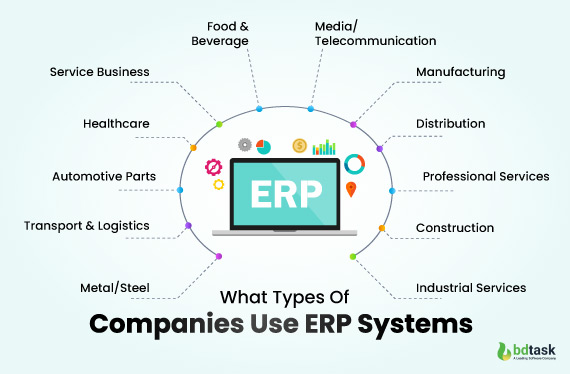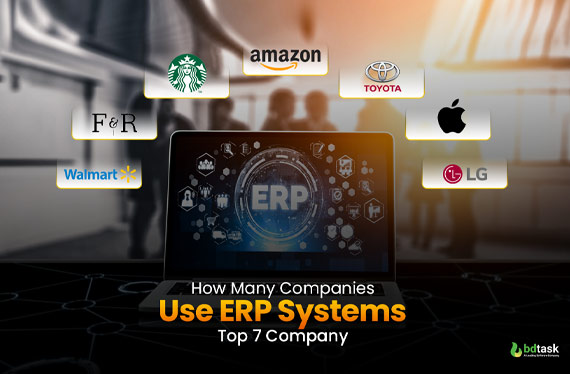How Many Companies Use ERP Systems - Facts and Statistics

ERP software is the bridge and ability to transform every aspect of the enterprise. So, how many companies use ERP systems in the year 2025? You must admit that an ERP system is necessary for every industry and business. Local shops, hospitals, and big companies use this system to track their resources and facilitate their operations.
ERP system helps to save billions of dollars every single year.
With a perfect ERP installed in your business, you can reduce costs while simultaneously building upon customer loyalty.
Well-known businesses worldwide use ERP systems to improve their ROI. Read on for our list of top companies that use ERP systems and how they improve their overall business growth.
Let's deal with it.
What Is an ERP System?
The global market for ERP software is projected to increase by $78.4 billion by the year 2026.
The full form of ERP is Enterprise Resource Planning.
It means that it is software that integrates all business activities. In its full form, we find the manifestation of its work. It helps you properly run your entire company's accounting, resource management, project management, financial, procurement, production, and related tasks.
It collects data from various sources, enables data flow between them, and stores transactional data. It is very important to manage the business activities properly. These activities can be of various types, such as a collection of multiple funds, product lists, inventory, production, accounting, etc.
A cloud-based ERP system can make all these tasks easier. Just as hubs in networking link up multiple computers and devices, ERP systems act as hubs in business. It tracks all the data of your business while maintaining its comfort.
ERP system supports all functions, including customisation.ERP systems, or software, help companies report real-time data. Anyone can access this system remotely. The main purpose of ERP implementation is to maintain consistency between the core activities necessary to run a company.
What Percentage Of Companies Use An ERP?
Implementation of ERP in your company is staying competitive and improving operational performance. As a result, it's a demanding software system nowadays.
According to research, on average 70% of large enterprises use ERP software .53% of organisations have seen a positive output from ERP implementation. Using rate also varies from region. like the USA, and Canada, ERP systems in Bangladesh, the United Kingdom etc. Apart from that What is an ERP system examples?
Top 10 ERP systems that well-known companies in the world use
- Oracle
- Netsuite
- Microsoft Dynamics 365
- Sales ERP
- Orion
- SAP
- ERPNext
- Odoo
- Acumatica
- Sage Intacct
What Types Of Companies Use ERP Systems

Many industries use ERP as their main software system. Take a quick look at some of the industries that use ERP software. What industries use ERP systems?
Let's check some of the ERP industry.
- Manufacturing
- Distribution
- Professional Services
- Construction
- Industrial Services
- Service Business
- Healthcare
- Automotive Parts
- Transport & Logistics
- Metal/Steel
- Food & Beverage
- Telecommunication/Media
Manufacturing industry is the main user of ERP, with 33.66%.
The rest of all use ERP software include the following industries:
|
Industries |
Using Rate |
|
Manufacture |
33.66% |
|
Information technology |
14.85% |
|
Professional or financial services |
13.86% |
|
public sector and nonprofit |
6.93% |
|
Distribution and/or wholesale |
9.90% |
|
Healthcare |
4.95% |
|
Retail |
3.96% |
|
Utilities |
3.96% |
|
Construction |
1.98% |
|
Mining |
1.98% |
|
Education |
0.99% |
|
Transportation |
0.99% |
Let's discuss it briefly.
Manufacturing In ERP
Manufacturing companies have used ERP systems for a long time to combine data from their various departments to create a more accurate picture. It has been helping them manage the business better by saving the data of many other departments. Including sales, finance, production, and inventory.
Although manufacturers get benefits by using ERP systems, it includes
- Planning optimisation
- Monitoring project progress in several locations through a single system
- Cost minimisation
- Simplify the operation process
- Increase the ROI
Distributing & Retail Used In ERP
ERP systems help communicate with other departments through a single database in the distribution and retail industries. A retailer can see the stock of his products from the system. Then, analyse which products are in high demand in the market and which products are used more by customers through this ERP system. Using ERP, retailers can gain accurate knowledge of market demand, product pricing, product inventory, type, and stock. Moreover, it plays an important role in a business. But you have to learn how to use the POS system in retail properly.
Professional Services in ERP
Many professional services use ERP software. Professional services use ERP to improve their financial reports, as well as improve their collaboration and communication. This software can track and manage business transactions in a single system. Professional services are greatly benefited by using it.
Construction In ERP
ERP System provides you with a single data source. It simplifies workflow cost, financial management, risk management, and so on in construction. This helps the construction industry to get real-time data flow that allows them to solve the problem instantly.
Service Business In ERP
how many companies use ERP systems? Apart from the construction sector service business sector uses ERP software as well.
ERP systems centralise customer data and provide them with better services. It collects data from multiple sources and maintains data integrity by eliminating data duplication. Users can work from one place with real-time access so that the data is updated and easily sent to the client.
The Educational Sector Uses ERP
Obviously !! The educational sector is a lot of manual work. So, you can face a lot of errors there. With the help of an ERP system, the paperwork is reduced, and the process is faster. However, it automated administration tasks and saved resources as well. It also helps you secure sensitive data such as financial statements and student personal information.
Health Care In ERP
Healthcare organisations have been using ERP systems for a long time. They use it to run their medical operations more smoothly and accurately.
Starting from time limits for
- Patients' appointments
- Employees work schedules
- Tracking patient's medical records
- Managing billing systems
- Online medicine sales and buying
All healthcare tasks can be easily done through this software, which saves costs and does not allow time to be wasted. Since ERP systems can be customised, healthcare organisations are using this software to customise it according to their needs. It helps monitor data and secure the management system.
Automotive Parts In ERP
The automotive industry uses this ERP system to centralise all records. Somethings like
- Includes their automotive parts maintenance
- Electronic database maintenance
- Integration with communication channels
- HRM management
- Sales
- Finance
These industries can share each database and handle activities smoothly.
It plays a major role in managing inventory activities. We all know that manually recording everything is time-consuming. Implementation of ERP is the solution for that.
Transports & Logistics In ERP
Like the sectors mentioned above, ERP systems are used in transport industries. Sales, inventory, production, HRM management, procurement, and more.
Operational cost, tracking, and vehicle management in transport industries are very difficult, while maintenance is challenging. In this demanding environment, the ERP system, as a centralised system, brings all the activities into one centre.ERP Systems fulfil their needs and maintain customer and vendor gateways, making difficult tasks easier.
Metal/Steel Industry in ERP
There is a lot of demand for steel in today's world. Their ERP system integrates all the operations, removes the useless ones, and integrates the processes. It helps traders adapt to current market demands and provides real-time updates. This, in turn, increases customer satisfaction and establishes a reputation for reliability in the market.
Instead of all of that, discuss the above food sector using ERP software. Since the food companies are performing the functions of buying and selling food online, the ERP system helps to maintain it. Online tracking, shipment tracking, inventory management, logistics optimisation and order fulfilment all are smoothly maintained by ERP.
How Many Companies Use ERP Systems-Top 7 Company

More than 210,767 companies in the world are using ERP systems. Among them, 171,809 companies are also using ERP tools. Let's talk briefly about the top 6 companies that used ERP Software. Let's face the question how many companies are using ERP systems? Here we try to gather some of the top companies that are using ERP systems. we also try to cover which company use erp system and why they use it.
1. Amazon -SAP
We all know that Amazon is an American Multinational Technology company that uses an ERP Solution System called SAP(system analysis and program development.
It was created in Germany in 1972. SAP systems play a special role in more advanced analysis using machine learning and AI. How many companies use ERP systems?
Approximately 39,668 companies are currently using it and serves 75,000 customers across 120 countries.
Let's check out some of the best features of SAP
- Financial management system
- Supply chain management
- Human resource management
- Customer relationship management
- Enterprise asset management
- Research and development
- Procurement and networks
- Enterprise performance management
- Internet of Things (IoT) and digital supply chain
- Analytics and Reporting
- Manufacturing and production planning
- Project and portfolio management
- Database and data management
2. Starbucks-Use Oracle ERP
No one has not heard about Starbucks. It's an American company that operates the largest coffee house chain. It is one of the most well-known organisations in the world. So they also use ERP software for their day-to-day tasks.
Mainly, Starbucks uses Oracle ERP.Oracle ERP is a closed ERP solution.
Source: Thomson Data (user of Oracle )
Features of Oracle ERP
- Financial management
- Procurement management
- Enterprise performance management
- Human capital management
- Customer relationship management (CRM)
- Analytics and business intelligence
- Asset management
- Order management
- Manufacturing management
- Project management
- Risk management and compliance
- Supply chain management
- Risk management system
3. Toyota-Microsoft dynamic365
Toyota is a Japanese automaker company. This company mainly manufactures and sells vehicles and other accessories. They sell cars in around 170 countries. More than that, Toyota is also known for its high-quality vehicles and dependability in many countries.
So this huge large organisation also have to maintain their daily task. They are also dependable in ERP smart solutions. Toyota uses Microsoft Dynamic365 software and leverages Microsoft consulting services to optimize their ERP implementation and ensure seamless integration across their global operations.
Over 58,313 global companies have selected Microsoft Dynamics as their ERP tool according to 6sense tracking-based data. (Report 2023)
Features of Microsoft dynamic365
- Sales management
- Supply chain management
- Human resources system
- Commerce management
- Project operations
- Analytics and AI.
- Customer service system
- Field service solution
- Marketing management
- Finance management
4. Apple -Incorporated SAP
Apple Inc. is a multinational and most recognisable brand and one of the largest companies in the world. They design and market personal computers, smartphones, tablet computers, and wearable devices.
Apple first incorporated SAP into their business in 2016. Apple uses the ERP platform to power its online store, App Store, and iTunes. SAP's modules help with finance, HR, CRM, and inventory control.
SAP's success limit has been increasing day by day in the past decade. The SAP ERP market is currently 7.92%. Experts predict that SAP ERP will grow to $2.3 billion by 2032.
Some of the best Modules and features
- Customer relationship management
- Human resource management
- Purchasing and inventory control
- Business intelligence
- Analytics and Reporting
- Inventory management system
- Supply chain management
- Financial management
- Mobile apps
5. Walmart
Walmart Inc. is an American retail corporation and grocery store. It signed a 5-year contract in 2018 to implement Microsoft Azure on a public cloud computing platform. It uses SAP for the company's transaction process. Walmart is one of the largest companies in the US that has successfully used ERP software. The annual turnover of this company is more than $500 billion. How many companies use ERP systems?
About 75.63% of companies with a huge net revenue of less than $50 million implement SAP ERP into their system.
Modules and Featured
- Business Intelligence system
- Distribution management
- Manufacturing management
- Sales Order Management.
- Supply chain management
- Financial management
- Mobile apps
6. Fulton & Roark-Netsuite ERP
Fulton Roark is a menswear company founded to provide products catering to modern menswear and personal care needs.
The company sells various thoughtful and tasteful creative products to retailers and consumers. Earlier, this company used spreadsheets to do all its transactions and inventory.
Later, it was found that this system lacked the necessary procedures, and the current process could not be properly maintained. So they started to search which erp is good for them.
Then they centralised the business operations into one system. They started using Netsuite ERP, and they later became successful.
Netsuite claims that it supports over 37,000 customers in 219 countries.
Modules and Featured
- Accounting management
- CRM management
- Financial Management
- Order Management
- Inventory Management
- POS system
- Warehouse management
- Human resource management
7. LG Electronics Company
Another well-known and famous home appliance and electronics corporation brand is LG, which originated in Korea. Since it was a worldwide company, HR data reporting was expensive and time-consuming.
All their data was handled manually, which was very complex. As the cost increased, they decided to switch to a single system. It centralises all operations in one place and simplifies HR administration.
Initially, managing this ERP system successfully was challenging for them. However, they minimised their difficulties within about five years and achieved their goals. After using ERP, they can improve customer/supplier intimacy, decision-making, the creation of new products, a unique business model, etc.
Modules and Featured
- HR Management management
- Manufacturing management
- Market & Sales management
- Inventory management
- Finance management
- Shipping & Payment.
Endnote
Ultimately, ERP software contributes to improved customer satisfaction for top companies. Reading this blog you can get a proper idea of how many companies use ERP systems and top companies using ratio. Apart from that implementing ERP systems enables companies to deliver better products and services to their customers. It also improves operations and reduces lead times and product quality. After all, all tools aim to drive long-term success.
As technology advances, these companies will continue to rely on ERP systems to drive innovation and maximum ROI.
Implement the sales ERP right now and unlock maximum potentiality for your company.










